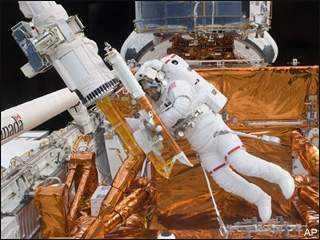Spacewalkers work on International Space Station
 Cape Canaveral, Florida - Two US astronauts left the safety of the International Space Station Thursday to install spare parts that will help it continue running smoothly in the future.
Cape Canaveral, Florida - Two US astronauts left the safety of the International Space Station Thursday to install spare parts that will help it continue running smoothly in the future.
Space shuttle Atlantis crew members Michael Foreman and Robert Satcher left the airlock at 1424 GMT for the planned six-and-a-half-hour spacewalk.
They will focus on installing a spare antenna to the outside of the station.
The Atlantis brought thousands of kilogrammes of extra supplies to the station as the shuttle programme enters its expected final year in 2010.
The shuttle delivered two platforms with 12,360 kilogrammes of spare parts, which will be installed on the outside of the station. Most of the gear was to be installed using the robotic arm, but some pieces, like the antenna in Thursday's spacewalk, must be physically bolted on by spacewalkers.
As the first of several flights devoted largely to delivering spare parts, this mission is laden with the highest-priority items.
The so-called Express Logistics Carriers lifted into space by the shuttle contain a variety of crucial parts: Gyroscopes that help keep the ISS at the proper altitude in space; an extra hand for the station's robotic arm; a gas tank for providing oxygen to the airlock during spacewalks; parts for the station's cooling system.
During the spacewalk, Foreman and Satcher will also conduct a variety of other construction and maintenance tasks, including lubricating the Japanese robotic arm.
Two more spacewalks are planned for later in the mission.
The retirement deadline of the shuttle is fast approaching with just five more launches scheduled and one year left to go in the programme.
NASA is at work on developing the next generation spacecraft with an eye on returning humans to the moon or travelling to Mars and beyond.
It will carry the crew on top of the rocket in a configuration that recalls the Apollo moon missions and which engineers say is safer than the space shuttle design, following the explosion of the Columbia in 2003. (dpa)